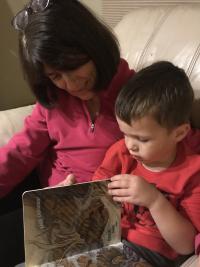Providing Support for Young Children in Their Homes
 Not all teaching takes place in the classroom, and this is no more apparent than in the careers of home interventionists. These people provide services to families in collaboration with the Department of Human Services Child Specialty Clinics and the Iowa Department of Education.
Not all teaching takes place in the classroom, and this is no more apparent than in the careers of home interventionists. These people provide services to families in collaboration with the Department of Human Services Child Specialty Clinics and the Iowa Department of Education.
Limited to early childhood, which is considered birth through age eight, these home interventionists assist parents with infants and toddlers in a number of different capacities, from helping them find quality childcare to providing evidence-based practices in the areas of communication, independent living skills and cognitive development.
Early childhood home interventionists also provide coaching to the families of children with disabilities or whose children are experiencing developmental delays.
To pursue this career path at UNI, a student must major in early childhood education, but are encouraged to also minor in early childhood special education for increased preparedness.
According to Dennis Ford, instructor for special education, many of the students who choose this path are inspired to do so because of a personal experience with special education. For others, the field experience -- actual in-home visits with a home instructor or speech-language pathologist -- is what leads them to develop a love for the work.
Ford also noted that there is currently a shortage of home interventionists, so students who follow this career path are likely to find themselves in demand after graduation.
